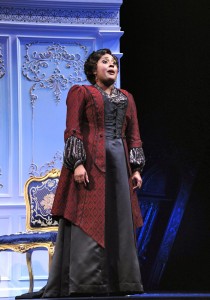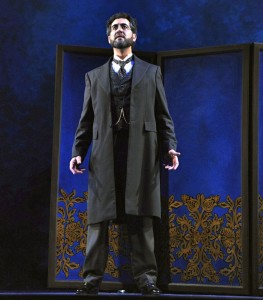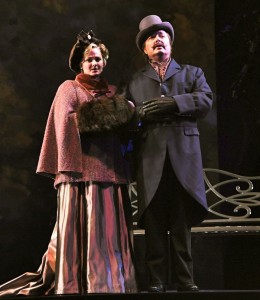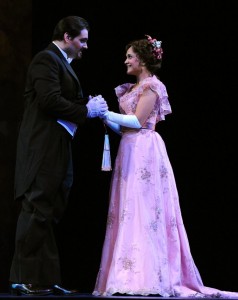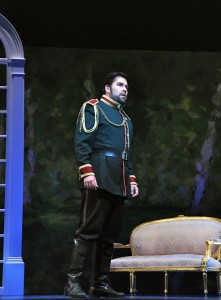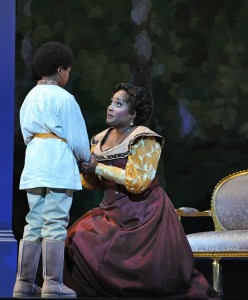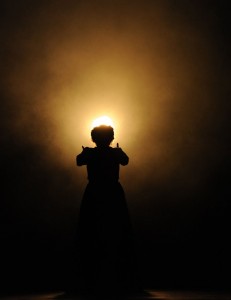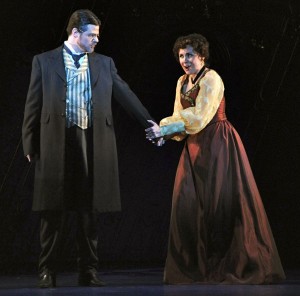“Happy families are all alike; every unhappy family is unhappy in its own way.” – from Anna Karenina by Leo Tolstoy
The overture starts loud and dissonant with lots of percussion. The first few measures invoke an image of a rushing railroad train. There is no curtain but the stage is in almost total darkness. The music continues. The stage slowly begins to lighten. People are walking rapidly across the stage, some left to right, others right to left. All are in a hurry. All ignore the others. There is no one instant to mark the end of the overture and the beginning of Act I, Scene 1. A pin-point of light grows slowly high up at the back of the stage. We are at the Moscow train station and a train is arriving. Except for the train headlight, everything is in shades of black and gray.
Anna arrives wearing a dark red dress. She looks at the hurrying passengers. They ignore her. The circle of light grows brighter. A dark figure of a man who had been facing the back of the stage slowly turns to face us. A young man with a tortured look on his pale finely chiseled face. He stares unseeingly at the audience for a moment, then squares his shoulders, turns, and walks steadily towards the on-rushing headlight – and suddenly disappears through a trap door. The music emulates the shriek of metallic brakes. There’s a scripted gasp from the passengers as they crowd around the place where he jumped and look down on the implied tracks – and an involuntary gasp from the audience.
All of this without a sound from the stage. All the sound is from the orchestra pit. Only now does Anna open her mouth to express her shock and sadness at the scene she has witnessed.
The opera has begun. And I have come to a stop. I need a new vocabulary. Last month I attended a great production of A Lion in Winter. It is called a “play”; the people on stage were “actors”; they opened their mouths to “speak”… A week later I attended a moving performance of La Traviata. It is an “opera”; the people on stage were “singers”; they opened their mouths to “sing”. But when Anna opened her mouth, she did not speak as Eleanor of Aquitaine did. Nor did she sing an aria as Violetta did. No, she vocalized her emotions in a clear soprano voice. It was as if her voice was simply a new instrument added to the orchestra – an instrument that could not only vary pitch and volume and timbre, but which could articulate words.
I need a new word. She “sprang” her emotions? She “soke” her emotions? They both sound too contrived. She “vocalized” would work, but seems pretentious. And do I call the performance a “playera”? an “operlay”? I don’t think so. No, I’ll settle for she “sang” and “opera”. But with the clear understanding that the words now have different meanings than when Verdi used them.
On to the performance. The story is complex. Count Tolstoy took several hundred pages to tell it. Composer David Carlson and librettist Colin Graham take almost three hours for the opera. Even the synopsis in the program takes a full two pages of very small print. In case you don’t remember the novel, here is the super-condensed plot.
Basically the story concerns love relations among 7 people. Anna (n�e Oblonsky) is married to Count Alexei Karenin and has a young son Serioja. The Count is stiff and cold and 20 years older than Anna, and he is more concerned with the existence of a scandal that with the scandal itself. But within these limitations he loves Anna.
Anna’s brother Prince Stepan (Stiva) is married to Princess Darya (Dolly), but Dolly has just found about Stiva’s extramarital affair and is both furious and heart-broken.
Stiva’s childhood friend Konstantin Levin lives in the country but has come to Moscow to propose to Dolly’s 18-year old sister, Princess Katerina (Kitty). To paraphrase the old saying, “Six are three couples, seven’s a crowd.” The seventh is Count Alexei Vronsky, a dashing young army officer.
Vronsky has seen Kitty at a couple of social occasions and has casually (on his part) flirted with her. She, in her debutante social year, takes the flirtation seriously and anticipates accepting a marriage proposal from him, so she clumsily turns down Levin’s proposal. Early in the opera Vronsky sees Anna and immediately falls deeply in love with her mature beauty, completely forgetting Kitty. Anna is attracted to him, but has a strong sense of duty and tries to resist the temptation.
The opera is divided into two acts with about 8 – 10 scenes in each act. The only break in the music or in the action is the single intermission. Each set is unbelievably simple: a settee and a featureless wall with a portrait on it; a garden bench with a floral background. Perhaps the most complex was a beautifully set banquet table and six chairs. All walls and backgrounds were lowered from overhead; all furniture was carried or wheeled on and off by the actor-singers or appropriately costumed stage crew. Characters unobtrusively left the stage on one side of the old scene as different characters entered in mid-conversation from the other to start the new scene. All of this was done with perfection, creating a continuous whole out of almost a dozen separate parts. Incredible.
I won’t begin to even try to describe the scene-by-scene unfolding of the soap-opera plot or the merits of the enormous cast. Instead, I’ll just mention a few random ones that stuck in my memory.
The seduction scene early in Act I. Vronsky has entered Anna’s dressing room as she is preparing for bed. She tells him to leave, to respect her honor. He pleads his love. She weakens, but resists. Repeat, until she capitulates and she leads him off to the bedroom.

A Day at the Races; (L-R) Lydia Ivanova (Kindra Scharich), Prince Yashvin (Paul Murray), Princess Betsy (Megan Stetson), Stiva Oblonsky (Michael Mendelsohn), and Dolly Oblonsky (Betany Coffland)
The race-track scene (shades of Ascot in My Fair Lady) with the titled spectators looking out at the audience but seeing instead an oval steeple chase and with their eyes following the horses pounding around it. The scene was vivid – but totally in our imagination. The horror as two horses collided and Vronksy went down under his horse.
The sickroom scene when Anna is apparently near death after miscarriage of the child fathered by Vronsky with the two rival Alexeis, Karenin and Vronsky, discarding their enmity in the impending seeming loss of Anna (p.s. she recovered).
The poignant scene where Anna is forced by Karenin to choose: avoid a scandal by leaving Vronsky or go with him and never see your son again.
The train station scene at the very beginning is reprised at the end of Act I as Anna describes her recurring nightmare. Then at the end of Act II Anna goes again to the station and the opening scene is played backwards, as if on a movie film in reverse. Anna imagines that the young man rises from the tracks and walks backwards towards the audience. She realizes that her life will never be anything but unhappy; the only solution is to end it.
Now Anna walks slowly towards the light. She merges with the light. She is the light. The light glows even more brightly, then slowly fades and shrinks, rising as it does so, as if to Heaven. Suddenly all is darkness – and silence. Anna is dead.
But before the audience can start applauding, wait. There is an Epilogue. It is spring time. All is light and cheerful. Kitty and Levin (remember them?) have reconciled and wed and she is blissfully holding their new baby. He is still worried about the meaning of life, but his old nurse comforts him and, in a quote from the synopsis in the program, “he at last understands the reason for living: To live, love, and be loved; not to judge or envy others, nor to bewail their suffering; to accept life is everything in itself. His blind eyes have been opened. ”
The opera is over. The audience applauds. A few of them stand. The curtain calls are well organized. As the applause continues more of the audience stand up; by the end I’d say it was more than half – but not all. We got to applaud not only the conductor Stewart Robertson as usual, but also the director Brad Dalton and the composer David Carlson. Quite an afternoon.
My reaction? Well, I remained seated – but I kept applauding. The concept was tremendous. To me, the execution was flawless but uninspired. I am too unfamiliar with the music to form an opinion. It wasn’t painful and it wasn’t boring, but I can’t say I liked it. I certainly would not listen to it as an audio recording, but I would gladly attend the opera again – in fact, I will attend it again next Sunday when I will see Cast A. Maybe I’ll have more of an opinion after seeing it a second time.
. . . . .
I do. It is Sunday evening, September 19, and I have just seen Anna Karenina for the second time and with the other cast.
At this point a professional critic would probably discourse on each of the six double-cast roles, and tell you which of the two artists was “better” and why. I don’t want to take that route because I thought both casts were good, and because the other underlined phrase in the preceding paragraph is the important one. In fact, I am going to promulgate Opera Nut’s Law of New Operas:
If a new opera is worth seeing once, it is worth seeing twice.
The first time I see a new opera, I am too conscious of its newness. In particular, Carlson’s music is so different from the more familiar music of Verdi and Wagner – although, come to think of it, the music isn’t much more different from Wagner and Strauss than W and S are from Puccini and Verdi!
There are even a couple of places where I actually liked the music, most notably in the opening scene of Act II with its melancholy hymn to Autumn. First as a trio by Stiva, Dolly, and Karenin and later as a reprise by most of the main characters.
Carlson has a great ability to write music that fits the mood of the opera. And, as I write this I realize that “mood” is the essence of Anna Karenina. To be sure, there are actions such as the train suicide, the steeplechase accident, Anna’s illness, but they are really just pegs on which to hang the moods of the participants.
Which brings me to the one negative thing I have to say about the opera. It was one scene too long! In one brief, improbable epilogue, Carlson attempts to undo the masterful job he has done in creating a mood of doom and gloom and convert it to one of sweetness and light.
Dramatically, the opera is over when “Anna walks slowly towards the light. She merges with the light. She is the light. The light glows even more brightly, then slowly fades and shrinks , rising as it does so, as if to Heaven. Suddenly all is darkness – and silence. Anna is dead.” The unhappy mood has reached its climax. The opera should be over.
And so should my review.
Ciao.
The Opera Nut
Opera San Jose
408-437-4450
California Theatre
345 South First Street
San Jose CA 95113
All photos: Pat Kirk
Future performances (all in September 2010)
Sundays at 3:00 pm; other days at 8:00
Tue 14, Fri 17, Sun 19, Thu 23, Sat 25, Sun 26
| Cast of Characters | Cast 1 | Cast A |
| Anna Karenina: | Jouvanca Jean-Baptiste | Jasmina Halimic |
| Kitty Scherbatsky: | Khori Dastoor | Khori Dastoor |
| Dolly Oblonsky: | Tori Grayum | Betany Coffland |
| Princess Betsy: | Megan Stetson | Megan Stetson |
| Countess Lydia Ivanova: | Kindra Scharich | Kindra Scharich |
| Agafia Mihailovna: | Heather McFadden | Heather McFadden |
| Konstantin Levin: | Alexander Boyer | Michael Dailey |
| Stiva Oblonsky: | Michael Mendelsohn | Christopher Bengochea |
| Alexei Vronsky: | Torlef Borsting | Krassen Karagiozov |
| Prince Yashvin: | Paul Murray | Paul Murray |
| Alexei Karenin: | Isaiah Musik-Ayala | Kirk Eichelberger |
This review by Philip G Hodge appeared in sanfranciscosplash.com on September 15, 2010.

